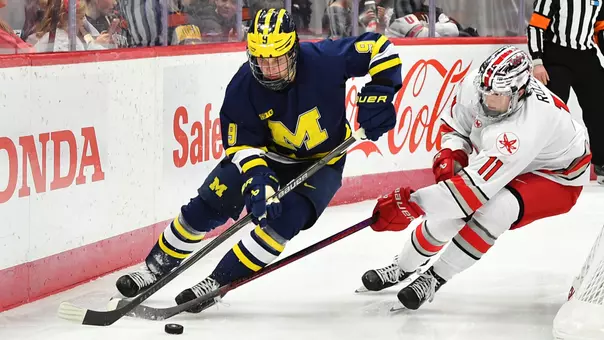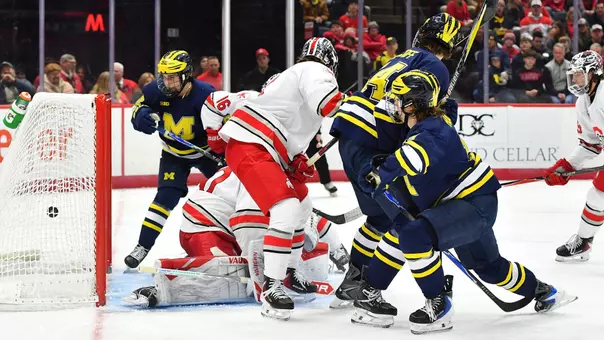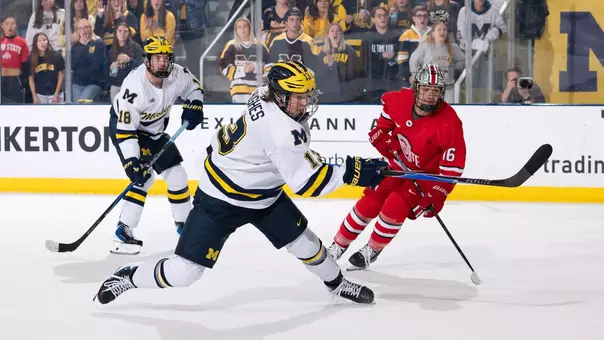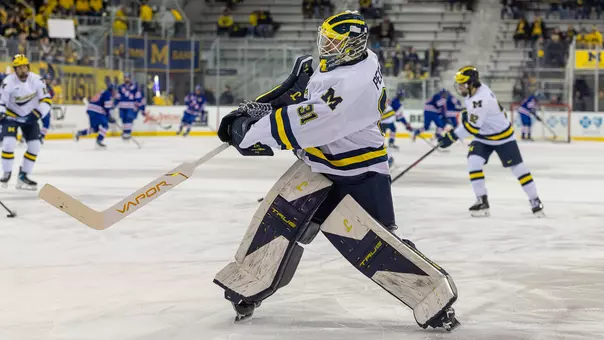Ice Hockey Alumni Spotlight: Justin Clark
12/3/2014 12:00:00 AM | Ice Hockey
Dec. 3, 2014

Justin Clark (1995-1999) was a member of the University of Michigan ice hockey team for four seasons, winning two national championships in 1996 and 1998. A native of Grand Rapids, Mich., Clark was a gritty right winger and key member of Michigan's penalty-killing unit during his time with the Wolverines. Clark earned the Alton D. Simms Award after his sophomore campaign in 1997 as the team's most improved player. He had a key assist in one of Michigan's most memorable games on March 28, 1998, a 4-3 win over North Dakota in the NCAA West Regional final at Yost Ice Arena, helping the Wolverines rally from a 2-0 deficit en route to their second national championship in three seasons. In 1999, at the conclusion of his senior year, Clark received the Joseph E. Barss Award as the best "true team player."
After playing one season of professional hockey, Clark decided to hang up his skates and return to school, pursuing his dream of a medical career. Clark was accepted into the University of Michigan Medical School, working extensively in the Department of Neurosurgery before earning his doctorate in 2007. Clark moved to Arizona where he was a Neurosurgical Resident at the Barrow Neurological Institute in Phoenix for seven years. He returned home to Michigan this summer, where he is currently a neurosurgeon at Great Lakes Neurosurgical Associates in Grand Rapids.
Q. You were a part of a golden era of Michigan hockey. What sticks out to you the most when you look back on your time at Michigan?
A. The memories that stick out in my mind are the time I spent with my teammates. We spent so much time together both inside and outside of the ice rink that they are the ones that dominate my memories. Whether it was running until we were exhausted during spring training with Jim Plocki, enduring long bus rides up to Marquette to play Northern Michigan University, celebrating Thanksgiving at Bubba Berenzweig's in-laws' house or sitting on our couches in front of our house on campus watching the U of M football game on the television with the sound of the stadium behind us, we did everything together. Even though our lives have all taken different paths since then, we all share that common bond from that special time during our lives. As I now realize that the players from every other U of M Hockey team before and after us shared those same experiences, the memories that I have from those times have become even more special to me. They are more special because they have made me realize that my teammates and I were part of something even bigger than what was going on during that moment. This feeling was crystalized when Brendan Morrison was interviewed after he scored the winning goal in overtime against Colorado College in 1996. In the interview, just seconds after the game was over, the first thing that came to Brendan's mind wasn't what a great player he was or what an amazing season we as a team had just had; instead, he told all the Michigan hockey alumni that were watching the game on television that "This is for all the guys who never had a chance to win it!" That willingness to work hard for the success of the team is what made Michigan hockey teams successful. As far as I am concerned, the golden era of Michigan hockey has been every year where individuals like Brendan Morrison pulled the sweater over their head and went onto the ice to battle with their teammates with one single goal in mind: to win for Michigan.
Q. Many of your teammates, including yourself, have gone on to extraordinary careers in hockey and away from the rink as well. Did you feel that so many would go on to success when you were playing at Michigan?
A. I think everyone expected players like Marty Turco to go on and have great professional hockey careers after college. Personally, while I was an athlete at Michigan, I did not expect so many others (including myself) to achieve such success after college. However, as I look back at the lessons that Coach Berenson taught us about achieving excellence and preparing for life after hockey, I am no longer surprised that so many of us have achieved so much once out hockey career were over. Not only were we provided insight into the key habits for success, but we were also rewarded for adopting these habits with national championships. I believe that these two elements are why so many went on to do well. We worked hard, and we tasted victory. Excellence is not unique to a specific discipline. It is an approach to how you manage tasks and deal with problems. Our experience as part of the Michigan hockey family is why so many of us in the program have gone on to succeed. And in reality, it is probably why we had such successful teams while at Michigan. Coach Berenson, Mel (Pearson) and Billy (Powers) assembled a group of guys with a wide range of talent who all shared a common willingness to work hard and sacrifice for their team. Those same characteristics that made us successful then have also made us successful now.
Q. What is your greatest memory of playing for Coach Berenson?
A. Well, there are a number of great memories that come to mind. I guess I will have to just pick one to share with you. During my senior year (1998-99), we were playing the University of Denver (U of D) at the NCAA Regional playoffs. The week before that game, we had just come off a huge emotional high after winning the CCHA playoff championship. As a result of this emotional exhaustion, we found ourselves the following week against U of D trailing 3-0 halfway through the game. At some point during the second period, Coach Berenson took a timeout and called us all over to the bench. He reminded us how hard we had worked to get to this point and that if we lost that game, we were done for the year. Then the last thing he said to us is something I will never forget.
He looked at all of us and said, "Now I want you guys to go out there and look the guy you are playing against in the eye. Look him in the eye and let him know that you want this more than he does."
We then went out and took over the game and won 5-3, outshooting Denver 22-1 from that point on. After the game all of the parents and reporters wanted to know what Coach had said to us that made us came out with such fire after the timeout. Coach always said the right thing at the right time to help us perform our best.

Q. You returned to Ann Arbor after being accepted into the University of Michigan Medical School shortly after retiring from pro hockey. What was it like to come back here and was this a goal during your playing career at Michigan?
A. Throughout my playing career at Michigan, I had been enrolled in a pre-med curriculum. So, when I came back to Ann Arbor after my professional hockey career was over, I felt like I was continuing on the journey of studying medicine I had started many years earlier. Nevertheless, it was an interesting experience to return to the University of Michigan once I had enrolled in medical school and to see the boys in the hockey program working towards all the same goals that I had worked towards when I was there.
For me, returning for medical school was in many ways a relief. I had put a ton of effort into becoming the best hockey player I could be. I was proud to have played a role in the success that my team had at Michigan; however, I was pretty sure that I wasn't going to have the long-term success in professional hockey that players like Mike Knuble had experienced. So, I hung up the skates and focused on academics. And this was a change for me because once I got back into the academic arena and I was able to focus solely on my studies without having practices and games filling up my weekly schedule, I was able to flourish. I felt very proud and relieved that I was able to walk into Coach Berenson's office each year after I had returned to Ann Arbor and let him know that I was achieving success in a challenging academic program.
Q. As part of your medical school research you worked in the Department of Neurosurgery conducting stroke research and traveled to San Diego, California, to conduct human physiology experiments with the U.S. Navy SEALs teams, talk about each of those experiences and how they may have impacted your career.
A. I know without a doubt that the work ethic I developed while at Michigan and that I carry with me today is in place because it was demonstrated to me by the senior teammates on my hockey team. When I saw how hard players like Jason Botterill and John Madden worked in order to become the amazing players that they were, I knew that I had to do more than I was accustomed to doing. And I did. So, when I took on new challenges like stroke research and human physiology research, it was that work ethic that I learned from my Michigan hockey teammates that gave me a chance to be successful in these endeavors. My mentor in medical research was an amazing individual named Warren Lockette, MD, known to many in the U of M athletic community as "Loc." Loc taught me how to think critically about clinical questions. As I worked to solve these clinical research questions, my quest put me in contact with many interesting and motivated people who had found success in areas outside of athletic and medicine. Specifically, my time with the U.S. Navy SEALs teams put me in contact with people with amazing attributes. Seeing what made these individuals successful gave me new insight into characteristics I could adopt that would make me more successful in my pursuits.
Q. Your career has taken you to Neurosurgical Residency at the Barrow Neurological Institute in Phoenix. Now you are back in Michigan at Great Lakes Neurosurgical Associates in Grand Rapids. How nice has it been to come back home to Michigan?
A. My time in Phoenix was probably the most academically "pure" time in my life, in that I was able to focus on learning as much about neurosurgery as I could. During that time, my wife, Emily and I spoke regularly about how the only way I would be able to focus on neurosurgery would be if she took over both her role and my role with raising the kids. It was a challenging time for both of us! But by taking on those challenges together, we have grown closer. Now that we are back in Grand Rapids and living within 15 miles of both her family and my family, we have all the support that we need, and we couldn't be happier. In short, coming back home to Michigan has been a dream come true.
Q. How often to you make it back to Michigan for games at Yost and do you still follow the team?
A. Ever since I pulled my Michigan jersey off for the last time, I have followed the team's progress each year. Usually that involves me catching the scores online at the end of the weekend or watching Doug Karsch's weekly report during the week. Now that I am back in the Eastern Standard Time zone, I plan on making it to at least a couple of games at Yost each year. It is always great to head back to Ann Arbor to catch up with old friends and take in the amazing atmosphere of Yost Arena.
The recently created Office of Alumni Engagement strives to foster a community, recognize the holistic student-athlete and honor the great Michigan Athletics history. This alumni spotlight illustrates the impact that our alumni are having around the world and how they stay engaged with Michigan.










